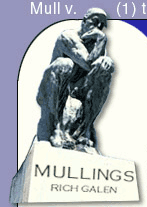|
|

|

Become a
Paid Mullings Subscriber!
(To join the FREE mailing list or to unsubscribe Click Here
The Messy Business of Democracy
Rich Galen Wednesday March 30, 2005
Click here for an Easy Print Version
- In the midst of other activity in the region, attention is being focused on the Iraqi Transitional Assembly and its inability to choose a Prime Minister and other officers to lead Iraq pending the adoption of a permanent constitution.
- In the elections in January, the Shiite coalition gained just over half the seats. The Kurds got slightly more than a quarter and the rest are split up between Shiites and independent groups.
- The second meeting of the Assembly was marked by outbursts, walkouts, and outright shouting matches yesterday as, according to the BBC, "MPs lashed out at political leaders for their failure to form a government."
- Here's something you have to remember about Iraqis: Assuming you don't speak Arabic, if you see two Iraqis talking to each other, it is impossible to know by their demeanor whether they are threatening to kill each others' families, neighbors, associates, and friends � or deciding upon where to go for coffee.
- Iraqis have a shockingly aggressive manner when they are speaking to each other.
- The basic mission of the 275-member Assembly, under the Transitional Administrative Law (TAL) is to choose a Prime Minister, a President and a Speaker until formal elections under a new constitution can be held.
- The TAL was adopted just about a year ago. (see "TAL Me a Tale" - the Iraq Travelogue from last March).
- According to that proto-constitution a 2/3 vote is required for the selection of a Prime Minister.
- Remembering our modern Iraqi history, the country is roughly half Shiite Muslim, about a third Kurds, and the rest Sunni Muslims and others.
- The Sunnis more-or-less boycotted the elections but in the spirit of compromise - which is new to these folks - it was decided that the Speaker of the Assembly would be a Sunni anyway. The Prime Minister will be a Shiite and the major Ministerial posts - Oil, Defense, etc - will be divvied up proportionately.
- Here is the lesson: Dictatorships are efficient. Democracy is messy.
- Under the old regime, this whole thing would have been decided about eight seconds after the polls closed on January 30 which Saddam having received 107% of the votes and his announcing the senior governmental officials (many of whom had names like Uday and Qusay) right on the spot.
- The Iraqis are new at this business of participatory democracy. During the negotiations over the TAL an Iraqi told me:
"We are used to bargaining for days over a penny. And at the end, either you have the penny or I have the penny.
"We have been bargaining over concepts. And at the end I have something and you have something.
"This is very new to us. Very new."
- The process of building a new government - a new culture, really - should not be measured in terms of its speed. If anything deliberation is the preferred course.
- The US Constitution (which, itself was a do-over following the failure of the Articles of Confederation) was adopted by the Constitutional Convention and the requisite number of states only after what the US Library of Congress web page calls, a "long and often bitter debate."
- In 1788 nine states had ratified the new Constitution which met the legal requirements, but four states, among them New York and Virginia, demurred. It was obvious that without those two, the Constitution would be in force, but would not be a force.
- In the end, the Bill of Rights and the publication of The Federalist Papers swayed enough legislators in the remaining states so all signed on.
- But members of the British Parliament watching the shenanigans in London misread the acrimony over the form of law in the former colonies and saw it as weakness. That perceived weakness was a contributing factor in the British attacking the colonies in what became known as the War of 1812.
- Opponents of President Bush and Prime Minister Blair should be warned: Do not mistake the messiness of the democratic process for weakness in those who are participating in it.
- On the Secret Decoder Ring page today: Links to the BBC and the New York Times coverage of the Iraqi Assembly meeting, a link to the Library of Congress page; a Mullfoto from New York, and a Catchy Caption of the Day.
--END --
Copyright © 2005 Richard A. Galen
Current Issue |
Secret Decoder
Ring | Past
Issues | Email
Rich | Rich
Who?
Copyright �2002 Richard
A. Galen | Site design by Campaign
Solutions. | |
|
